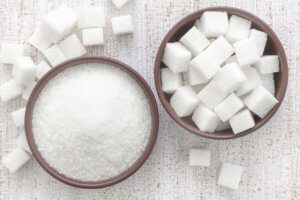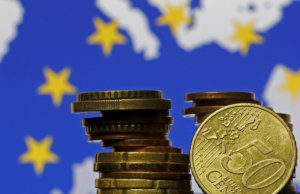
Sugar production in Ukraine as of December 19 amounted to 1.64 million tonnes.
According to the Ukrtsukor National Association of Sugar Producers, at present sugar refineries in the country have processed 12.1 million tonnes of sugar beets.
As reported, Ukraine started a new sugar making season on August 31.
In 2018, the area under sugar beets was 280,000 hectares, which is 13% less than in 2017.
Ukraine exported 560,400 tonnes of sugar in the 2017/2018 agricultural year (September-August), which is 27.2% less than in the previous agri-year.
Sugar production in the 2017/2018 agri-year increased by 6.5% and amounted to 2.14 million tonnes. Some 46 sugar factories were operating during the season.

Minister of the Cabinet of Ministers Oleksandr Saenko expects that the next tranche from the European Union (EU) in the amount of EUR 10-20 million for governance reform could arrive in April or May 2019. “We had a very good political dialog with our European partners. They already have an official position regarding readiness to continue supporting this reform. We expect the next tranche in April-May,” he said in an interview with Interfax-Ukraine.
According to Saenko, the amount of the tranche will depend on the criteria, but according to forecasts, next year Ukraine will receive about EUR 10-20 million for this reform.
“Next year, much will change in the remuneration of civil servants. The remuneration of new reform specialists is a prototype of the remuneration model of civil servants, where the fixed part is at least 70%. This model is laid down in the law on public service. For specialists on reform issues, these parameters have already been established. We have limited the bonuses to 30%. This makes it impossible to establish sky-high bonuses,” the minister added.
Saenko said that now there is still a big imbalance in the system itself, when the position salary is minimal, and total wages and salaries increase significantly due to allowances and bonuses. This, according to the minister, creates dependence on the political biased will of the chief with all the attendant consequences.
“The new system will be more transparent and balanced, and we will gradually transfer the financing of the reform at the expense of the main programs of the ministries’ central offices,” Saenko said.

State-owned enterprise (SOE) Pivdenne Design Bureau (Yuzhnoye, Dnipro) has put the Yuzhnoye computer center with the most powerful super computer in Ukraine into operation, the press service of the bureau reported. According to the report, the unique computer was developed specially for solving of engineering and scientific tasks using methods of computational physics in cooperation with MTI, Hewlett Packard Enterprise, APC and ANSYS.
“Reliable and smooth functioning of the computer center is guaranteed by the developed engineer and computer infrastructure and effective tasks solution is guaranteed by the most advanced software, which is used for simulation in such fields as aerodynamics, mechanics, heat exchange and physics,” the press service said.
The bureau said that the high-performance system of super computer contains a hundred of servers and approximately 4,000 of computational cores and newest architecture processors. The general size of random access memory is approximately 18 terabytes, as well as storage for data with a size of 200 terabytes is available. All super computer components are connected using special high speed computer network. Moreover, the system is equipped with a hybrid computing servers with new graphic accelerators and separate modules for processing and visualization of big calculation data.
The peak performance of super computer is 300 teraflops (Trillion Floating-Point Operations per Second) and this can be compared with the power of 1,000 of personal computers operating simultaneously, the press service said.
The access to such computer power will allow the Pivdenne Design Bureau’s specialists to study hundreds of technical solutions and implement the most optimal and effective ones, it will also enhance possibilities for implementation of new and non-standard ideas, the press service said.
The Pivdenne Design Bureau is a leading research center of Ukraine and a holder of advanced space technologies, many of whose products and services are exported to the EU, the United States, and other countries.

The Kyivstar mobile communications operator has launched the Mobile ID service, allowing the digital identification of persons for obtaining e-services using the mobile number. According to a press release of the operator, the service is available in Kyiv, Dnipro, Ivano-Frankivsk, Odesa, Kharkiv, Kherson, Vinnytsia, Khmelnytsky, Lviv, Zhytomyr and Cherkasy. In total, these cities have 22 open points for issuing Mobile ID SIM-cards and certificates from the accredited key certification center of justice authorities. They can be received by individual entrepreneurs, contract subscribers and corporate clients of Kyivstar from any locality of Ukraine.
“Now we are focusing our efforts on connecting the cities, which are regional centers. We have already covered 11 cities. In the beginning of 2019, we will announce the opening of new locations. And we will move further “deep countryside” to make Mobile ID connection available in small cities,” the press service of the operator said, citing Director for Business Development in the Corporate Market in Kyivstar Yevhen Krazhan.
The operator said that the project was implemented in partnership with the accredited key certification center of the judicial authorities, which is an authorized provider of electronic trust services. All points, where Mobile-ID SIM-cards are issued, have been duly certified, as well as the staff responsible for connecting the service to users.
According to Kyivstar, the large-scale implementation of Mobile ID will simplify the provision of services to the population by government and commercial institutions, eliminating the intermediary link between the source of services and the customer and, thus, reducing excessive red tape, queues and costs.
The Mobile ID service can be used to obtain electronic public services (driver’s license, car registration, residence registration, income declaration, voting and petitions, receiving social assistance); health care (medication, access to the history of the disease, monitoring indicators) and education (access to the website of the educational institution and personal account, distance education, receiving certificates, extracts). It can also be used for the financial and banking sectors (payments, opening/closing accounts, receiving references, insurance, loans); corporate market (login, workflow, VPN, mobility), for online purchases, auctions and other services.
To connect to the Mobile ID, a subscriber needs to contact the certified connection point with the original passport and identification code and replace the SIM card with a new having Mobile ID support for free.
In this case, the subscriber receives a free digital certificate of a natural or legal person for a period of one year. The cost of using the Mobile ID service is already included in the tariff plans with a monthly fee of UAH 225 per month, for other tariff plans it is UAH 50 per month.
The operator invites service providers to cooperate to jointly expand the online services available to the public.

Ancient Slavic amusements, horse riding, the masters fair, hot dishes and drinks, the New Year`s Residence and thrilling flash mobs will be waiting for the guests of Ancient Kyiv. On December, 22 -25, and also December, 29-30 the guests will see an interactive musical performance, the main characters of which will be the horses and the actors of the theatre of Ancient Kyiv.
On the night from December, 31 2018 starting from 20:00 on January, 1 2019 a grandiose New Year`s night celebration will take place in Ancient Kyiv!
Ancient Kyiv opens at 10:00. The program starts at 13:00.
The ticket price for December, 22-30: a full adult ticket – 150 UAH, for pensioners and students – 100 UAH, for schoolchildren – 50 UAH, for preschool children – for free.
The ticket price for the New Year`s night: a full adult ticket – 395 UAH, for pensioners and students – 250 UAH, for schoolchildren – 150 UAH, for preschool children – for free.
Ancient Kyiv in the Principality of Kyivan Rus is not far from modern Kyiv – only in a 45-minutes’ drive – in the Kyiv region, Obukhiv district, vill. Kopachiv. Route taxis leave from Kyiv from the «Vydybitchi» metro station (the exit from the metro to the «Fourchette» supermarket), according to the schedule on the website.
The Interfax subscribers can save money with the “openbusiness-20” promo code for a 20%-discount for the adult ticket (at full price) to the Principality of Kyivan Rus:
– by previous order by tel.: +38 044 461-99-37, +38 050 385-20-35
– or at the cash desk at the entrance to the «Kyivan Rus Park».